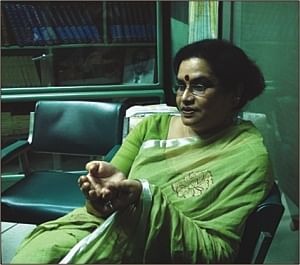Eleven years of bliss

Durba Roy Chowdhury
From 1976 to 1987, Durba Roy Chowdhury spent much of her days in the inspiring and idyllic milieu of Visva Bharati at Shantiniketan. A devoted classical and Rabindra Sangeet artiste and trainer, Durba replicated her Visva Bharati experience at her own music school 'Gayoki'. In a recent conversation, the artiste shared her fond memories of Shantiniketan with The Daily Star.
Born in a culturally oriented family in Kolkata, Durba was exposed to music at an early age. She also received intensive training in both classical music and Tagore songs. She completed the Sangeet Pravakar, a five-year diploma course from Allahabad.
“My mother (also a classical singer) wanted me to take formal training on music from Visva Bharati. However, it would not be true to say that music lessons are all I got from there. I learnt much more; it was a way of life, a unique worldview. Without any doubt, those years were the best in my life. 'Divine bliss' is how I would term this unparalleled period in my life.”
The artiste gets nostalgic about special days at Visva Bharati: Pahela Baishakh (The Bengali New Year), Poush Mela (Winter fair), Borsha Mangal (Welcoming the monsoon), Basanta Utsab (Spring festival) and many more.
"Out there it seemed that we were always readying ourselves for festivals all round the year. All students had to participate in these programmes. Most days the afternoons went in rehearsals.
"On Pahela Baishakh, a nightlong event on classical music is held every year. Basanta Utsab was an event where people (between the ages of three to forty) participated in a rally, which ended at the Amra Kunja (mango orchard) in the institute. Everyone dancing to the song O re grihobashi, khol dar khol, laaglo je dol. Then begins the jalsa, featuring songs and dance performances. In the end, we all showered each other with abeer (color). After the event, we used to chitchat in small groups; there were songs as well.
"On the seventh day of the Bengali month Poush, begins the three-day Poush Mela; the main attraction is a musical programme featuring Baul songs. In our time, Bauls from the entire Birbhum area joined the grand event. Another attraction was the amazing fireworks, which went up and down the sky, creating images of Tagore or Nazrul.
"The indigenous community of Shantiniketan, mostly the Santals, displayed their handmade products at the fair. The Santal women also took part in a special dance, putting one's hand on other's waist -- a performance worth watching."
Asked if she cherishes any particular incident at Shantiniketan, the artiste smilingly says, "As I was a young girl then, it all seemed quite romantic to me; it's hard to single out one. However, on the personal front there are memories that stand out: I remember convocation day when I received my certificate from the then Prime Minister of India, Indira Gandhi.
"Another aspect is the informal relationship between teachers and the students at Visva Bharati, it was more like parent-child relationship. I had the opportunity to learn from personalities like Kanika Bandopadhyay, Neelima Sen, Ashesh Bandopadhyay, Gora Sarbadhikari, Arup Ratan Bandopadhyay, VV Wajelwar and others. 'Mohor di' (as the students used to call Kanika Bandopadhyay) was an excellent teacher. In a 40-minute class, she made almost 40 students learn a complete song -- flawless, no matter how tough the song was. Her teaching method was easy and effective."
We were privileged to meet maestros such as Pandit Ravi Shankar, Pandit Gyan Prakash Ghosh, Pandit Jasraj, Pandit V.G. Jogh.
Durba has replicated this teaching methodology at her own music school, Gayoki -- established in 1992. "We are like a family. I try to teach my students in simple and inspiring ways. I try to instil a sense of right and wrong in them from a young age so that they can emerge as good human beings," she concludes.

 For all latest news, follow The Daily Star's Google News channel.
For all latest news, follow The Daily Star's Google News channel. 



Comments